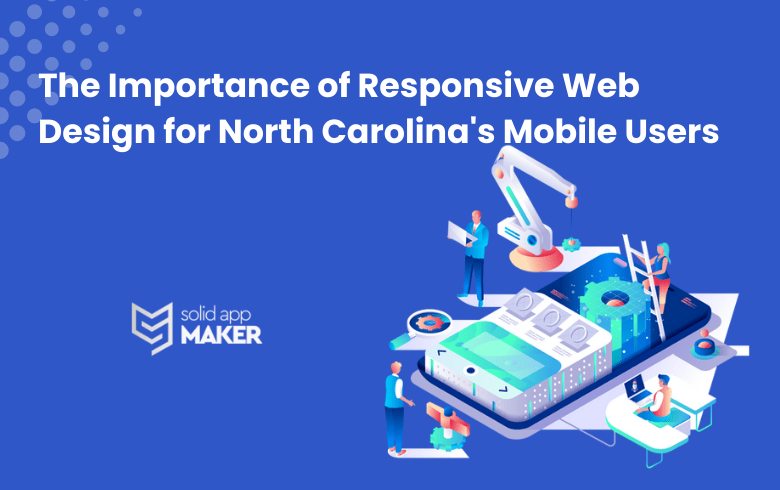Mobile devices have become an indispensable part of our lives in today’s digital age. With the increasing number of people relying on smartphones and tablets to browse the internet, businesses in North Carolina must adapt to this mobile-centric landscape. One crucial aspect of catering to mobile users is embracing responsive web design. Responsive web design offers a myriad of advantages that directly benefit the mobile users of North Carolina, ensuring a seamless and enjoyable browsing experience.
By understanding the significance of responsive web design for North Carolina’s mobile users, businesses can effectively connect with their target audience and thrive in the ever-evolving digital landscape.
In this blog post, we will explore the significance of responsive web design and how it benefits mobile users in North Carolina.
Understanding Responsive Web Design:
Responsive web design refers to an approach that ensures websites adapt to different screen sizes and resolutions, providing an optimal viewing experience across all devices. It achieves this through the use of fluid grids, flexible layouts, media queries, and responsive images. The key benefits of responsive web design include improved user experience, higher conversion rates, and enhanced search engine optimization.
Mobile Usage Trends in North Carolina:
Before delving into the importance of responsive web design, let’s look at the mobile usage trends in North Carolina. Statistics show that the adoption of mobile devices is on the rise, with a significant increase in smartphone usage. More and more people are accessing the internet through their mobile devices, emphasizing the need for businesses to cater to this growing mobile audience.
Advantages of Responsive Web Design for North Carolina’s Mobile Users:
Here, we will delve into how responsive web design enhances user experience, improves accessibility, boosts website performance, increases search engine visibility, and gives businesses a competitive edge in the local market. By understanding these advantages, businesses can effectively cater to the growing mobile audience and stay ahead in the digital realm.
Consistent User Experience: Responsive web design ensures a consistent and seamless user experience across devices. Whether users access your website on a desktop, smartphone, or tablet, they will have a visually appealing and user-friendly experience, allowing them to navigate quickly and engage with your content.
Accessibility and Usability Considerations: Mobile users interact with websites differently than desktop users. Responsive web design considers touch-friendly interfaces, making it easy for users to interact with buttons, menus, and forms on their mobile devices. Straightforward navigation and content hierarchy are also crucial for mobile users, ensuring they can find the information they need quickly and efficiently.
Improved Website Performance: Slow-loading websites frustrate users and lead to high bounce rates. With responsive web design, you can optimize your website’s performance for mobile devices, reducing loading times and providing a seamless browsing experience. This optimization keeps users engaged and positively impacts your website’s search engine rankings.
Better Visibility on Search Engines: Search engine optimization (SEO) is essential for businesses to increase their online visibility. Responsive web design is vital in SEO by improving your website’s mobile-friendliness. Search engines, like Google, prioritize mobile-friendly websites in their rankings, allowing your business to appear higher in search results and attract more organic traffic.
Competitive Advantage in the Local Market: In a competitive market like North Carolina, having a responsive website gives you a significant advantage over competitors who haven’t embraced the mobile-friendly design. By providing an exceptional user experience, you establish your brand as modern, reliable, and customer-focused, ultimately attracting more visitors and converting them into loyal customers.
Best Practices for Implementing Responsive Web Design:
Implementing responsive web design requires careful planning and execution. Here are some best practices to ensure a successful implementation:
Prioritize mobile users in the design process by adopting a mobile-first approach.
Consider different screen sizes and resolutions to create a seamless experience across all devices.
Optimize images and media for mobile devices to reduce loading times.
Test and debug your responsive design on multiple devices and browsers to ensure consistency and functionality.
Monitor and update your responsive design to adapt to evolving technology and user needs.
In today’s mobile-driven world, responsive web design is not just a luxury but a necessity, especially for businesses in North Carolina. By prioritizing the mobile user experience, businesses can reap numerous benefits, including improved user engagement, higher conversion rates, and better visibility on search engines. Responsive web design gives businesses a competitive edge in the local market, attracting and retaining more customers.
At Solid App Maker, we understand the importance of responsive web design for North Carolina’s mobile users. Our skilled web designers and developers specialize in creating responsive websites that deliver exceptional user experiences across all devices. Contact us today to discuss how we can help your business thrive in the mobile era.

